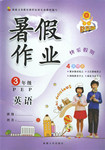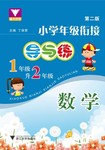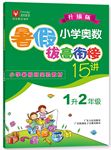
— Learning a language isn't easy.It takes time.
—I agree._______.There's no short cut.
A.All roads lead to Rome B.Rome wasn't built in a day
C.Practice makes perfect D.Slow but sure wins the race
 学练快车道快乐假期暑假作业新疆人民出版社系列答案
学练快车道快乐假期暑假作业新疆人民出版社系列答案 浙大优学小学年级衔接导与练浙江大学出版社系列答案
浙大优学小学年级衔接导与练浙江大学出版社系列答案 小学暑假作业东南大学出版社系列答案
小学暑假作业东南大学出版社系列答案 津桥教育暑假拔高衔接广东人民出版社系列答案
津桥教育暑假拔高衔接广东人民出版社系列答案 波波熊暑假作业江西人民出版社系列答案
波波熊暑假作业江西人民出版社系列答案科目:高中英语 来源: 题型:阅读理解
Take a look at the following list of numbers: 4, 8, 5, 3, 7, 9, 6. Read them loud. Now look away and spend 20 seconds memorizing them in order before saying them out loud again. If you speak English, you have about a 50% chance of remembering those perfectly. If you are Chinese, though, you’re almost certain to get it right every time. Why is that? Because we most easily memorize whatever we can say or read within a two-second period. And unlike English, the Chinese language allows them to fit all those seven numbers into two seconds.
That example comes from Stanislas Dahaene’s book The Number Sense. As Dahaene explains: Chinese number words are remarkably brief. Most of them can be spoken out in less than one-quarter of a second (for instance, 4 is “si” and 7 “qi”). Their English pronunciations are longer. The memory gap between English and Chinese apparently is entirely due to this difference in length.
It turns out that there is also a big difference in how number-naming systems in Western and Asian languages are constructed. In English, we say fourteen, sixteen, seventeen, eighteen and nineteen, so one might expect that we would also say oneteen, twoteen, threeteen, and fiveteen. But we don’t. We use a different form: eleven, twelve, thirteen and fifteen. For numbers above 20, we put the “decade” first and the unit number second (twenty-one, twenty-two), while for the teens, we do it the other way around (fourteen, seventeen, eighteen). The number system in English is highly irregular. Not so in China, Japan, and Korea. They have a logical counting system. Eleven is ten-one. Twelve is ten-two. Twenty-four is two-tens-four and so on.
That difference means that Asian children learn to count much faster than American children. Four-year-old Chinese children can count, on average, to 40. American children at that age can count only to 15. By the age of five, in other words, American children are already a year behind their Asian friends in the most fundamental of math skills.
The regularity of their number system also means that Asian children can perform basic functions, such as addition, far more easily. Ask an English-speaking seven-year-old to add thirty-seven plus twenty-two in her head, and she has to change the words to numbers (37+22). Only then can she do the math: 2 plus 7 is 9 and 30 and 20 is 50, which makes 59. Ask an Asian child to add three-tens-seven and two-tens-two, and then the necessary equation(等式) is right there, in the sentence. No number translation is necessary: it’s five-tens-nine.
When it comes to math, in other words, Asians have a built-in advantage. For years, students from China, South Korea, and Japan --- outperformed their Western classmates at mathematics, and the typical assumption is that it has something to do with a kind of Asian talent for math. The differences between the number systems in the East and the West suggest something very different --- that being good at math may also be rooted in a group’s culture.
What does the passage mainly talk about?
A. The Asian number-naming system helps grasp advanced math skills better.
B. Western culture fail to provide their children with adequate number knowledge.
C. Children in Western countries have to learn by heart the learning things.
D. Asian children’s advantage in math may be sourced from their culture.
What makes a Chinese easier to remember a list of numbers than an American?
A. Their understanding of numbers.
B. Their mother tongue.
C. Their math education.
D. Their different IQ.
Asian children can reach answers in basic math functions more quickly because ____________.
A. they pronounce the numbers in a shorter period
B. they practice math from an early age
C. English speaking children translate language into numbers first
D. American children can only count to 15 at the age of four
查看答案和解析>>
科目:高中英语 来源: 题型:阅读理解
It is common to consider learning as something that takes place in school, but much of human learning occurs outside the classroom, even from birth and people continue to learn throughout their lives.
Even before they enter school, young children learn to walk, to talk, and to use their hands to use toys, food, and other objects. They use all of their senses to learn about the sights, sounds, tastes, and smells in their environments. They learn how to communicate with their parents, grandparents, siblings, friends, and other people important to their world. When they enter school, children learn basic academic subjects such as reading, writing, and mathematics. They also continue to learn a great deal outside the classroom. They learn which behaviors are likely to be rewarded and which are likely to be punished. They learn social skills for communicating with other children. After they finish school, people must learn to deal with the many major changes that affect their lives, such as getting married, raising children, and finding and keeping a job.
Because learning continues throughout our lives and affects almost everything we do, the study of learning is important in many different fields. Teachers need to understand the best ways to educate children. Psychologists, social workers, criminologists, and other human-service workers need to understand how certain experiences change people’s behaviors. Employers, politicians, and advertisers make use of the principles of learning to affect the behavior of workers, voters, and consumers.
Learning is closely related to memory, which is the storage of information in the brain. Psychologists who study memory are interested in how the brain stores knowledge, where this storage takes place, and how the brain later outputs knowledge when we need it. In contrast, psychologists who study learning are more interested in behavior and how behavior changes as a result of a person’s experiences.
The author thinks “Learning”in the passage most refers to_________.
A. life-long learning B. family learning
C. learning after graduation D. behavior learning
The underlined siblings in the second paragraph probably means______.
A. teachers B. classmates C. doctors D. brothers or sisters
Which period of children’ life does they begin to how to behave well according to the passage?
A.After they go int society
B.Before they enter school
C.When they are at school
D.Before they are born
Which of the following is WRONG according to the passage?
A. As a matter of fact, learning begins with formal school education
B. Teachers need to understand the best ways to educate their students.
C. People need to understand how certain experiences change their behaviors.
D. Employers should study the principles of learning to manage their workers well.
The author tries to tell us ______in the last paragraph
A. learning is closely related to memory and experience
B. psychologists are interested in the wat the brain stores knowledge
C. psychologists are more interested in a person’s behavior
D. the relationship between learning, brain and behavior
查看答案和解析>>
科目:高中英语 来源: 题型:阅读理解
“It hurts me more than you”, and “This is for your own good” —these are the statements my mother used to make years ago when I had to learn Latin, clean my room, stay home and do homework.
That was before we entered the permissive period in education in which we decided it was all right not to push our children to achieve their best in school. The schools and the educators made it easy for us. They taught that it was all right to be parents who take a let-alone policy. We stopped making our children do homework. We gave them calculators, turned on the television, left the teaching to the teachers and went on vacation.
Now teachers, faced with children who have been developing at their own pace for the past 15 years, are realizing we’ve made a terrible mistake. One such teacher is Sharon Clomps who says of her students—“so passive” —and wonders what has happened. Nothing is demanded of them, she believes. Television, says Clomps, contributes to children’s passivity. “We’re talking about a generation of kids who’ vet never been hurt or hungry. They have learned somebody will always do it for them, instead of saying ‘go and look it up’, you tell them the answer. It takes greater energy to say no to a kid.”
Yes, it does. It takes energy and it takes work. It’s time for parents to end their vacation and come back to work. It’ s time to take the car away, to turn the TV off, to tell them it hurts you more than them but it’ s for their own good. It’s s time to start telling them no again.
Children are becoming more inactive in study because _______.
A. they watch TV too often B. they have done too much homework
C. they have to fulfill too many duties D. teachers are too strict with them
We learn from the passage that the author’s mother used to lay emphasis on _______.
A. learning Latin B. discipline
C. natural development D. education at school
By “permissive period in education” (L.1, Para.2) the author means a time _______.
A. when children are allowed to do what they wish to
B. when everything can be taught at school
C. when every child can be educated
D. when children are permitted to receive education
The main idea of the passage is that _______.
A. parents should leave their children alone
B. kids should have more activities at school
C. it’s time to be more strict with our kids
D. parents should always set a good example to their kids
查看答案和解析>>
科目:高中英语 来源: 题型:阅读理解
阅读下面短文,撑握其大意,然后从36~55各题所给的四个选项(A、B、C和D),选出最佳选项。
I had my first job at the age of thirteen, when a friend of my mother’s who owned a bookshop _36 me for six hours a week to help her in the shop. I was very 37 to earn my own pocket money and my parents 38 interfered(干涉) with how I spent it, even when I was spending it 39 . They believed that by earning money, spending it, and learning from the 40 , I would become more mature(成熟) and 41 about how to handle work, relationships with others, and money.
Like many 42 parents, my parents also let me and my brothers do things over which they 43 a great deal. When I was sixteen, for example, after I finished high school and before I entered university, I wanted to spend the summer months traveling around 44 . My mother was against the idea of my traveling alone at such a young age, but my father felt that it would be a great 45 for me. In the end, my father won the 46 on the condition that I limited my traveling to France, my mother’s home, where I had many uncles, aunts and cousins 47 through the country who could 48 shelter and help if I need them.
Three years later, my younger brother decide to 49 a year off after his first year in university and travel through the United States and the Caribbean. Again my mother was very worried and not 50 to see my brother leave school, but my father encouraged him and my brother had a(n) 51 year working his way on trains and ships to 52 passage to different ports and cities, and discovering many fascinating places and people.
These kinds of experiences are probably rare(稀少的) for children in many countries but in the US they are fairly 53 . Most parents start 54 their children at a young age to do small things by themselves. By the time they have finished high school, many American kids have already had part-time jobs, traveled around the US or other countries on their own, have 55 the university they plan to attend and maybe even decided on their future career, and so on.
A.taught B.allowed C.treated D.hired
A.anxious B.content C.proud D.hopeful
A.never B.ever C.always D.even
A.quickly B.foolishly C.seriously D.honesty
A.work B.mistakes C.others D.books
A.strict B.reasonable C.polite D.responsible
A.American B.Japanese C.Chinese D.British
A.helped B.supported C.shared D.worried
A.Asia B.Africa C.Europe D.Oceania
A.journey B.experience C.chance D.possibility
A.argument B.game C.discussion D.plan
A.send out B.give out C.carry out D.spread out
A.promise B.afford C.provide D.serve
A.leave B.make C.take D.prepare
A.angry B.eager C.sorry D.sad
A.unusual B.hard C.strange D.busy
A.accept B.earn C.find D.search
A.welcome B.fit C.necessary D.common
A.bringing B.forcing C.pushing D.protecting
A.selected B.admired C.afforded D.left
查看答案和解析>>
科目:高中英语 来源: 题型:阅读理解
The requirements for high school graduation have just changed in my community. As a result, all students must 36 sixty hours of service learning, 37 they will not receive a diploma. Service learning is academic learning that also helps the community. 38 of service learning include cleaning up a polluted river, working in a soup kitchen, or tutoring a student. 39 a service experience, students must keep a journal(日志)and then write a 40 about what they have learned.
Supporters claim that there are many 41 of service learning. Perhaps most importantly, students are forced to think 42 their own interests and become 43 of the needs of others. Students are also able to learn real-life skills that 44 responsibility, problem-solving, and working as part of a team. 45 , students can explore possible careers 46 service learning.
For example, if a student wonders what teaching is like, he or she can choose to work in an elementary school classroom a few afternoons each month. 47 there are many benefits, opponents (反对者) 48 problems with the new requirement. First, they 49 that the main reason students go to school is to learn core subjects and skills. Because service learning is time-consuming, students spend 50 time studying the core subjects. Second, they believe that forcing students to work without 51 goes against the law. By requiring service, the school takes away an individual's freedom to choose.
In my view, service learning is a great way to 52 to the community, learn new skills, and explore different careers. 53 , I don' t believe you should force people to help others the 54 to help must come from the heart. I think the best 55 is one that gives students choices: a student should be able to choose sixty hours of independent study or sixty hours of service. Choice encourages both freedom and responsibility, and as young adults, we must learn to handle both wisely.
36. A. spend | B. gain | C .complete | D. save |
37. A. and | B. or | C. but | D. for |
38. A. Subjects | B. ideas | C. Procedures | D. Examples |
39. A. With | B. Before | C . During | D. After |
40. A. diary | B, report | C . note | D. notice |
41. A. courses | B. benefits | C . challenges | D. features |
42. A. beyond | B. about | C. over | D. in |
43. A. careful | B. proud | C. tired | D. aware |
44. A. possess | B. apply | C. include | D. develop |
45. A. Gradually | B. Finally | C . Luckily | D. Hopefully |
46. A. through | B. across | C. of | D. on |
47. A. So | B. Thus | C . Since | D. While |
48. A. deal with | B. look into | C . point out | D. take down |
49. A. argue | B. doubt | C . overlook | D. admit |
50. A. much | B. full | C . less | D. more |
51. A. cost | B. pay | C. care. | D. praise |
52. A. contribute | B. appeal | C. attend | D. belong |
53. A. Therefore | B. Otherwise | C. Besides | D. However |
54. A. courage | B. desire | C. emotion | D. spirit |
55. A. decision | B. purpose | C. solution | D. result |
查看答案和解析>>
湖北省互联网违法和不良信息举报平台 | 网上有害信息举报专区 | 电信诈骗举报专区 | 涉历史虚无主义有害信息举报专区 | 涉企侵权举报专区
违法和不良信息举报电话:027-86699610 举报邮箱:58377363@163.com